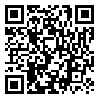BibTeX | RIS | EndNote | Medlars | ProCite | Reference Manager | RefWorks
Send citation to:
URL: http://irancounseling.ir/journal/article-1-108-en.html
The purpose of this research was to investigate the effectiveness of group education based on choice theory on increasing flexibility and marital satisfaction. The research design was a quasi-experimental design with pretest-posttest with control group. The population consisted of all married women referring to Women Association in Garmsar. 12 couples were selected and assigned into two experimental and control groups with available sampling and voluntary, and with regard to entry and exit criteria. The experimental group received eight sessions of choice theory-based intervention and control group received no intervention. The research tools included Enrich Marital Satisfaction Questionnaire and Flexibility Questionnaire. The data were analyzed with multi-variate analysis of covariance. The results showed that group education based on choice theory has had positive effects on the flexibility in couples (F=8.69, P<.01). Also, group education based on choice theory lead to increase marital satisfaction in couples (F=16.68, P< .01). According to these results, group education based on choice theory can be used for increasing marital satisfaction, improving marital relationships, and decreasing conflicts and preventing couples’ struggles.
Received: 2015/11/18 | Accepted: 2015/11/24 | Published: 2015/11/24
| Rights and permissions | |
 |
This work is licensed under a Creative Commons Attribution-NonCommercial 4.0 International License. |


